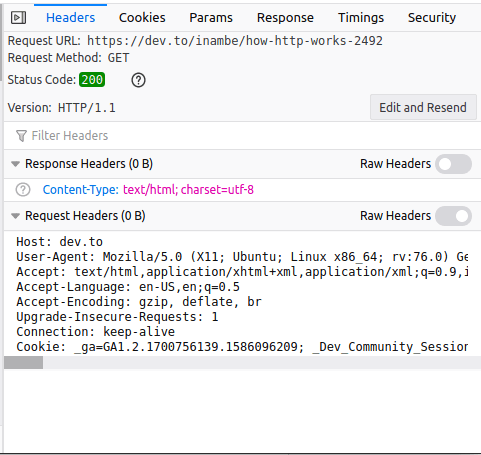HTTP is a protocol used for WWW(World Wide Web) which serve us functional websites, web applications, and web APIs. HTTP clients (internet browsers...
For further actions, you may consider blocking this person and/or reporting abuse


Literally HTTP can be used over UDP but actually, HTTP until v2 is not designed for UDP transport. And you will never see any browser support HTTP over UDP. HTTP/3 may change that but it's too soon to say.
How did you get the CLI output you showed in your post? Did you use
curl?I used Firefox dev tools' Raw Headers option:

For response:

There are better options though.
You can also use curl -v.
What is the request generated or what is the process happened when we hit google.com on browser?
If you meant where; browser generate HTTP request for us.
Browser uses TCP/IP protocol to connect to google.com's server(DNS routing happens here). When connection is made, browser send HTTP request(which is essentially a text) to server using the connection. Server then respond to browser using same connection and browser receives and interpret that.
I'll further explain TCP/IP and connections in my next post where I'll create a bare(not using high-end APIs like provided by node and frameworks like express) web server using TCP/IP.
Nice
Http2 means
What are these new versions of http like http2 and how these are different from http
HTTP, in its essence, is just rules agreed by concerned orgs and people. Now, rules change for betterment, so did HTTP rules over the time, and there are several HTTP versions(HTTP 1.0, HTTP 1.1, HTTP 2 ...). These rules need to be implemented by both clients(browsers) and servers(apache, nginx) to be fully functional (e.g. if server respond with HTTP 2 response but browser didn't implement HTTP 2 it won't work). HTTP 2 is a major release which defines new rules and it's completely different from HTTP 1.X but it has yet to be as popular/supported as HTTP1.X.